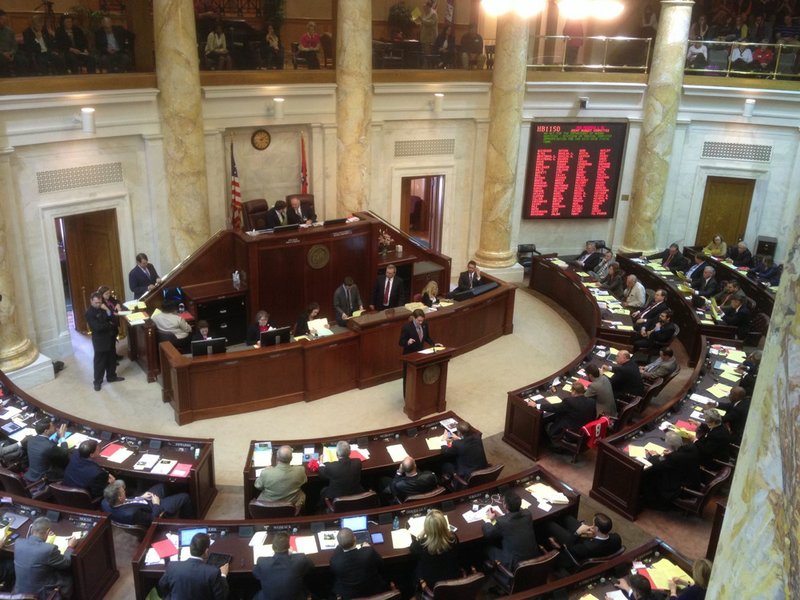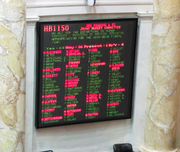3:30 p.m. UPDATE
The state House of Representatives has voted down a bill to fund private option Medicaid expansion, but House Speaker Davy Carter says votes will be held until it passes.
The appropriation bill for the private option required a three-quarters majority, or 75 votes. It fell short Tuesday afternoon on a 70-27 vote.
Carter, R-Cabot, said after the vote that the House will vote as many times as necessary — beginning with a second vote Wednesday afternoon — until the bill is passed.
The vote came after several representatives, including Rep. Bruce Westerman, R-Hot Springs, and Rep. Charlotte Douglas, R-Alma, addressed legislators and urged 'no' votes.
Carter, despite vowing that no further negotiations will take place, said the bill will get 75 votes.
"I still am 100 percent confident that that bill will pass," he told reporters. "How many times we have to vote, I'm not sure. I mean maybe once we get through hearing all the campaign speeches, we'll vote it. I heard two campaign speeches today. I heard one member who complained about not having a seat at the table, but we've been debating this for 18 months ... and has not offered anything to the process."
The private option narrowly passed last year but since lost at least two votes in the Senate. State Sen. Missy Irvin, R-Mountain View, has said she will vote against it this year after supporting it in 2013. And Sen. John Cooper, R-Jonesboro, who was elected in a special election, opposes the private option. His predecessor, Sen. Paul Bookout, supported it.
Carter vowed at the start of the fiscal session last week that the private option would pass both the House and Senate, adding that failing to do so would create an about $90 million hole in the budget.
The private option plan allows the state to buy private insurance for Arkansans with incomes of up to 138 percent of the poverty level using federal Medicaid money.
The program initially is covered entirely by federal funds, but the state by 2020 would have to pay for 10 percent of it.
For full coverage, see Wednesday's Arkansas Democrat-Gazette.
EARLIER
Supporters of the private option Medicaid expansion funding bill appeared to have gathered the necessary votes for passage in the state Senate on Tuesday, the same day the state House of Representatives was expected to vote.
The appropriation bill for the private option requires a three-quarters majority in both chambers, which means 75 votes in the House and 27 in the Senate. The House is set to convene at 1:30 p.m.
Gov. Mike Beebe, speaking to reporters late Tuesday morning, said it's hard to say whether the votes are there in the House.
"The House is always harder to predict," he said. "We'll just have to wait and see."
The Senate had been expected to take up the private option as soon as Wednesday, though there was no immediate confirmation it would happen then.
Negotiations have been ongoing in that chamber, where nine senators had been believed before Tuesday to be planning to vote down the measure and prevent passage.
But one of those nine — Sen. Jane English, R-North Little Rock — indicated Tuesday morning that she will now vote for the measure after receiving support to alter workforce investment programs, she told Talk Business.
English didn't return a message seeking comment Tuesday morning, but Beebe told reporters the Arkansas Economic Development Commission will lead the program to tie workforce training "to the needs of businesses and industries."
He said the result of the effort will be better coordination among different workforce-training entities, including two-year colleges, as well as increased accountability.
"The whole workforce thing has been fragmented among a bunch of different agencies and it hasn't been performance-based," he said. "It hasn't been tied to programs where you actually are showing that the workforce training by two-year colleges or tech schools or whatever. .. has actually been geared toward real job creation in conjunction with business and industry."
The program pools together existing workforce training money and adds about $5 million in new money, including about $3.8 million in rainy day money, Beebe said. He said the total collected money for the program will be about $23 million to $24 million.
Beebe characterized the agreement as the result of an ongoing negotiation, stressing English was "not asking for anything specifically for herself."
"She's not asking for anything for her or her district," Beebe said. "This is a statewide deal."
Beebe acknowledged the arrangement should provide the 27 votes needed for passing the bill.
The private option narrowly passed last year but since lost at least two votes in the Senate. State Sen. Missy Irvin, R-Mountain View, has said she will vote against it this year after supporting it in 2013. And Sen. John Cooper, R-Jonesboro, who was elected in a special election, opposes the private option. His predecessor, Sen. Paul Bookout, supported it.
House Speaker Davy Carter vowed at the start of the fiscal session last week that the private option would pass both the House and Senate, adding that failing to do so would create an about $90 million hole in the budget.
The private option plan allows the state to buy private insurance for Arkansans with incomes of up to 138 percent of the poverty level using federal Medicaid money.
The program initially is covered entirely by federal funds, but the state by 2020 would have to pay for 10 percent of it.


